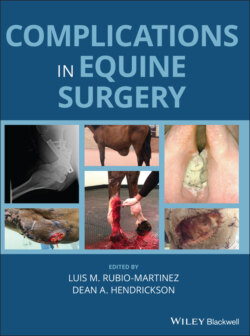Читать книгу Complications in Equine Surgery - Группа авторов - Страница 75
Immunological Reactions
ОглавлениеDefinition
Immunogenic transfusion reactions are classified as acute or delayed. Acute reactions include hemolysis, non‐hemolytic systemic fever reactions and anaphylaxis. The only delayed immunologic transfusion reaction reported in veterinary medicine is post‐transfusion purpura occurring in a previously blood transfused dog with hemophilia.
Risk factors
Foals <7 days [31]
Patients that have received multiple previous transfusions
Multiparous mares
Hypernatremic animals
Pathogenesis
The immunogenicity of blood products stems from proteins and from other cellular material not completely removed during production. Generally hemolytic transfusion reactions are the result of antibodies in the recipient plasma reacting with the erythrocytes of the donor. These types of reaction should therefore not occur if the plasma is free of red blood cells. Minor reactions can occur when antibodies present in the plasma of the donor react with the red blood cells of the recipient. Non‐hemolytic febrile reactions are thought to occur due to leukocyte antigens on transfused lymphocytes, granulocytes or platelets and antibodies in previously sensitized recipients. Urticarial reactions are not well understood but are believed to occur due to proteins in the donor blood and antibodies in the recipient blood. There is usually not a specific antigen against which the recipient is reacting. Systemic anaphylaxis is the most severe form, which in humans is linked to IgA antibodies but unknown in horses. Immunological transfusion reactions are reported as <10% in horses [29, 31]. Plasma can also contain large amounts of sodium, which could lead to clinically significant hypernatremia in small patients (e.g. neonates).
Prevention
